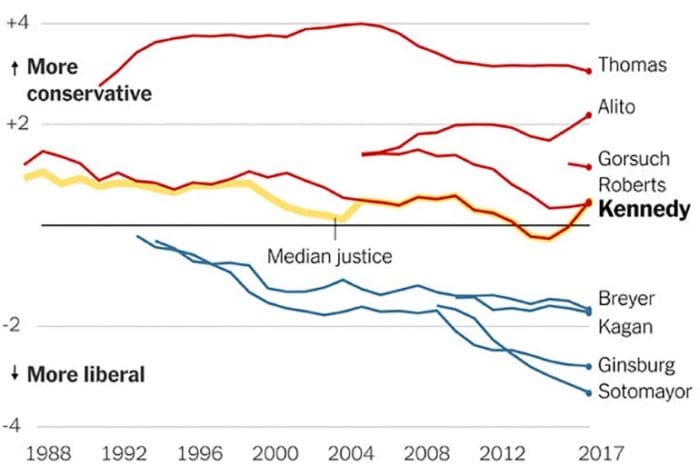We’re fortunate to have a few attorneys as contributors here at TTAG. Given this week’s announcement that Justice Anthony Kennedy will be retiring from the Supreme Court, I asked them to give us their thoughts on Kennedy and the future of Second Amendment jurisprudence.
Johannes Paulsen:
People concerned about the right to keep and bear arms owe Mr. Justice Kennedy a salute and friendly wave as he walks away from the bench. Sure, to borrow from Goldwater, Kennedy never failed to moderate his pursuit of justice, and tended to shrink away from the extreme in his defense of liberty. But hells, put him next to “unlimited Commerce Clause” Breyer, and the guy looks like a Ron Paul-esque paragon of liberty and virtue.
If I’m disappointed that he (allegedly) was playing hide-the-ball with additional Second Amendment jurisprudence after 2011’s McDonald v. City of Chicago, that is a small thing when you look at the grand scope. Before Kennedy, the Second Amendment wasn’t even on the radar. The NRA itself thought it was a losing proposition before the court. No Kennedy? We would still be living in the U.S. v. Miller world of no individual right to keep and bear arms, no incorporation of the Second Amendment to the several states.
Just think: there are no more “no-issue” zones for concealed carry on the handgunlaw.us map. That is, in the sweep of history, huge. No, he doesn’t get the hugs and warm tears that I’d give Mr. Justice Thomas when he eventually decides to hang it up, but he helped defend liberty. Let’s not forget that.
The timing of his departure should serve to remind everyone concerned about the right to keep and bear arms just how important this, and every election is. This will be the second Supreme Court justice appointed by Donald Trump. Clarence Thomas is 70. Breyer turns 80 in August. Ginsburg is 85. Life expectancy in the USA is 78.8 years. Go out, support Senate candidates friendly to the Second Amendment. Get them elected. It’s important.
Louis K. Bonham:
The frustration for 2A supporters of late has been “why won’t the Court take any 2A cases to enforce Heller?” The short answer has been that the Court was in a classic Mexican standoff, with four justices (Roberts, Thomas, Alito, Gorsuch) being strongly pro-2A and four (Ginsburg, Breyer, Karen, and Sotomayor) prepared to gut Heller . . . and a notoriously unpredictable Anthony Kennedy with the swing vote. Neither side could be sure which way he’d go, and thus neither side wanted to risk losing. And so lower courts learned that they could defy Heller with impunity.
Assuming that President Trump nominates someone from the existent list of 25, and that the Senate GOP hangs tough (and/or a couple of Dems facing tough reelection fights go wobbly), those days are over. The GOP has been promising a return to a conservative Supreme Court since 1968, but thanks to Blackmun, Powell, Stevens, O’Connor, Kennedy, and especially Souter, our own nominees have prevented that from happening. After almost 50 years of liberal Supreme Court activism, there finally is a likelihood of a solid originalist majority. This is truly a generational event.
On gun rights, I think the first step we’ll see will be to slap down a “may issue” carry license system from a place like Hawaii, NJ, NYC, etc., where “may issue” is in reality “no issue” (except for the politically connected). In so doing, I suspect the Court will explicitly require “strict scrutiny” of laws that affect the RKBA (which means that very, very few laws will survive the challenge). Requiring “strict scrutiny” will then require lower courts to revisit many of their prior decisions (like the 4th Circuit’s approval of the MD “assault weapons” ban).
Another important trend this appointment will cement is the continued gutting of the administrative state. The Court is already signaling that the days of judicial deference to bureaucratic actions and interpretation are coming to an end. This will radically impact the way government business is done across the board, including how the BATFE operates. For instance, I don’t think a BATFE “reinterpretation” of the 1934 Act to ban bump stocks is going to fly with the new Court (although a law passed by Congress doing so might well).
The biggest thing will be that lower courts will know that the Court stalemate on 2A cases is over, and thus they will no longer be able to thumb their nose at Heller. Sure, there will be some judges barking at the moon (there always are), but once the new Court makes it clear that 2A rights are no longer “second class,” I think the pieces start falling into place.
